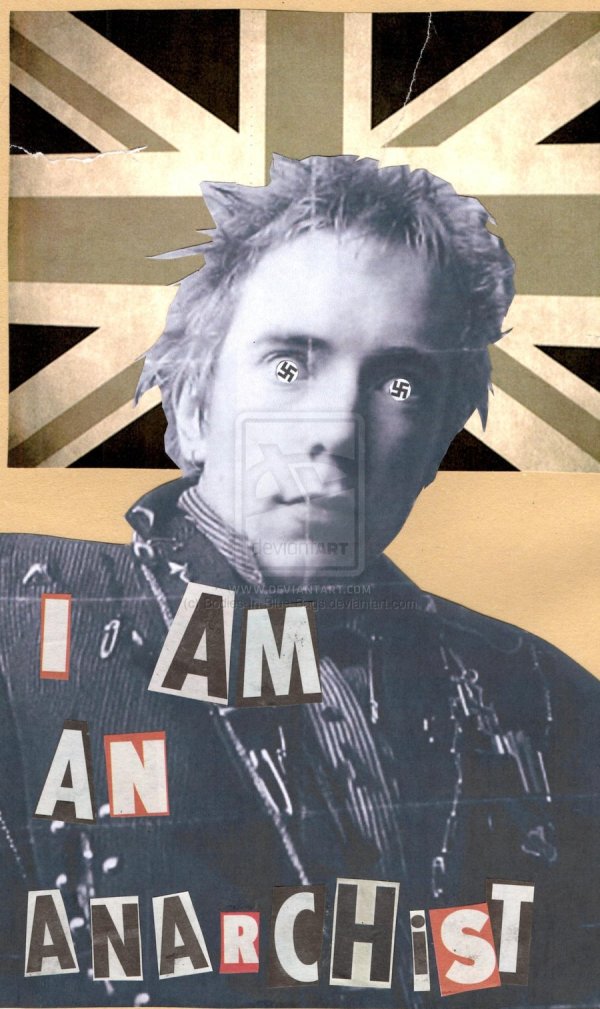EDITOR’S NOTE: This interview originally posted on November 11th 2015.
 BY JONATHAN VALANIA Thirty-eight years after the release of Never Mind The Bollocks, the windshield of pop culture is still fogged up with the huffing and puffing of critics of hyperventilating over the game-changing filth and the fury of The Sex Pistols — for which John Lydon, aka Johnny Rotten, served as acerbic, bug-eyed jester raging against the machinery of a corrupt Establishment and a necrotic music biz with a voice like Godzilla’s death ray — so I will spare you the lecture. Except to say this: in the fullness of time, Public Image LTD, the band he formed from the ashes of the Pistols that went on to make 10 albums over the course of numerous line-ups, stops and starts in the last 37 years, has proven to be way more punk — if that’s even quantifiable, and for the sake of this introduction let’s pretend it is — than the Sex Pistols. Although Bollocks, the Pistols sole album, obviously scared the bejesus out of the powers that be back 1977, today it just sounds like a kick-ass rock n’ roll record full of big buzzsaw guitar riffs and super-catchy middle finger-flipping anthems.
BY JONATHAN VALANIA Thirty-eight years after the release of Never Mind The Bollocks, the windshield of pop culture is still fogged up with the huffing and puffing of critics of hyperventilating over the game-changing filth and the fury of The Sex Pistols — for which John Lydon, aka Johnny Rotten, served as acerbic, bug-eyed jester raging against the machinery of a corrupt Establishment and a necrotic music biz with a voice like Godzilla’s death ray — so I will spare you the lecture. Except to say this: in the fullness of time, Public Image LTD, the band he formed from the ashes of the Pistols that went on to make 10 albums over the course of numerous line-ups, stops and starts in the last 37 years, has proven to be way more punk — if that’s even quantifiable, and for the sake of this introduction let’s pretend it is — than the Sex Pistols. Although Bollocks, the Pistols sole album, obviously scared the bejesus out of the powers that be back 1977, today it just sounds like a kick-ass rock n’ roll record full of big buzzsaw guitar riffs and super-catchy middle finger-flipping anthems.
Meanwhile, the barbed wire art-rawk shatterings of PiL’s back catalog still sounds like a man lighting himself on fire in a tub full of electric eels, an  aesthetic borne of necessity given Lydon’s towering limitations as a vocalist and composer. What you are hearing is the sound of Lydon’s voice chafing against the narrow avenue of expression nature afforded him, and we can only wonder what might have been if he had, say, pipes like Elvis, and could strum his own tune like Dylan. Still, he managed to make a silk purse out of a sow’s ear with 1986’s “Rise,” a big chugging march of sneering angularity that distilled the raison d’ etre of Lydon, the Sex Pistols and punk itself down to this potent mantra: Anger is an energy.
aesthetic borne of necessity given Lydon’s towering limitations as a vocalist and composer. What you are hearing is the sound of Lydon’s voice chafing against the narrow avenue of expression nature afforded him, and we can only wonder what might have been if he had, say, pipes like Elvis, and could strum his own tune like Dylan. Still, he managed to make a silk purse out of a sow’s ear with 1986’s “Rise,” a big chugging march of sneering angularity that distilled the raison d’ etre of Lydon, the Sex Pistols and punk itself down to this potent mantra: Anger is an energy.
But by 1992 PiL had run out of anger, not to mention ideas and relevance, and the band went dark for the next 23 years. Fast forward past a couple Pistols reunions, two biographies, numerous aborted TV shows, a lucrative and wildly successful turn as a butter pitchman on British television, a move to Los Angeles, and, eventually, American citizenship. In 2009, Lydon and a re-constituted PiL started performing again, making the rounds of the festival circuit, and two years later went into the studio to record This Is PiL. That album is probably best understood as a portrait of the anti-Christ as a middle-aged man trying to get his sea legs back. The new PiL album, the shockingly vital What The World Needs Now, is probably best understood as a portrait of the anti-Christ as a middle-aged man catching a second wind. It is probably the best album PiL ever made, it is also probably 23 years too late.
Nevertheless, the show must go on. PiL plays Union Transfer tomorrow night, so I will leave you with two thoughts: First, Heath Ledger’s now-iconic Joker — a social disruptor of apocalyptic proportions — is Johnny Rotten in white face. Some men, as the saying goes, just want to watch the world burn. Lydon gave those men a voice, and, by extension, a face. Second, he’s still a dick — it’s so cute. He’s been at war with the media for going on 40 years, and storming out of interviews on the flimsiest of pretexts in a fit of apoplexy is his trademark move. The video below is a perfect example. I got to witness this firsthand. As you are about to read, he did the phoner equivalent of storming out of an interview, he hung up on me. For committing the journalistic crime of asking him a question about Ginger fucking Baker. Adorable.
PHAWKER: Let’s talk about the new record, which is a very vital-sounding and varied record. Some songs sound really snarling and raw and others are measured and artful.
JOHN LYDON: It’s the full open agenda of being a human being isn’t it? And for me I think it’s possibly the greatest piece of work that I’ve helped contribute to in a long time. It’s an album I’m very very proud of. It’s one not to be ignored. It’s great performing. We perform quite a bunch of these songs live. It’s very exciting.
PHAWKER: It’s getting a good response from the audience?
JOHN LYDON: Oh very exceptional responses. Tearing the houses down, really. We love these kind of up-close 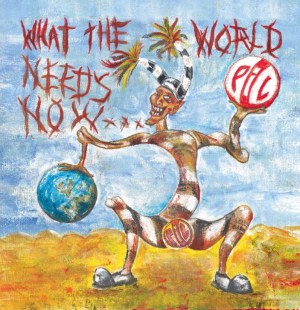 and personal smaller venues. They’re much more intimate. You get a real sense of the reaction that certain songs have because everything is within eyeball contact. It becomes very very warm, and there’s a great deal of variety in a public image audience. It’s always a reward to see so many different variables of the human gender all in one building being friendly with each other.
and personal smaller venues. They’re much more intimate. You get a real sense of the reaction that certain songs have because everything is within eyeball contact. It becomes very very warm, and there’s a great deal of variety in a public image audience. It’s always a reward to see so many different variables of the human gender all in one building being friendly with each other.
PHAWKER: Let’s talk about “Bettie Page.” You sort of characterize her as being a social disrupter and, despite the fact that she took her clothes off for a living, an empowered woman for her time. Tell me about what prompted you to write the song.
JOHN LYDON: Well I don’t know what you just said at the beginning of that but I would dispute it. I’ve never seen the human body as something that should be hidden. I don’t know who invented clothes but it certainly wasn’t nature. Although they’re very practical in certain weather conditions. I’ve never found the human body to be something that should be chastised or viewed negatively, and there she was, knowing all of that just trying to make money, as she has every right to but did no harm to no one and had to endure the far-right, religious fanatics and the mafia were running the clubs and yet I think with a great sense of dignity came through. Everybody now knows Bettie Page and knows her as a warm character, and I wanted to celebrate that fact. I’ve just become an American citizen in the last couple years and well there you go, there’d be one of my heroes. I’d much rather celebrate Bettie Page than the Temperance Movement.
PHAWKER: I wanted to ask you about your citizenship. When exactly did that happen?
JOHN LYDON: A couple years back now.
PHAWKER: Congratulations on that.
JOHN LYDON: Yeah I’m very very very proud of it.
PHAWKER: Are you?
JOHN LYDON: Yes, I am I went through the regular course you know, no exotic scams going on. I went as a regular person. I wanted to contribute to the country I’ve lived in for so long in a much more serious way. It was fun, the enrollment, I enjoyed every aspect of it. That’s three countries I now can say I truly belong to: Ireland, England, America. That’s wonderful for me.
PHAWKER: I’m curious why you wanted to take on American citizenship when it’s my understanding that you were offered a MBE by the British government and declined, is that correct?
JOHN LYDON: No, I was never offered one. There was talk about it but I think, like everything in the media, it was just talk and none of it based on truth and I have to suffer the consequences of journalistic fantasy.
PHAWKER: I apologize for perpetuating that wrong information.
JOHN LYDON: Well and you’ve got to be serious too. Those MBEs, no thank you. I don’t like that award system, it’s not for me. It’s just pomp and circumstance, which I like sometimes but not if I’m the caricature in the middle of it.
PHAWKER: Are you planning to vote this coming election?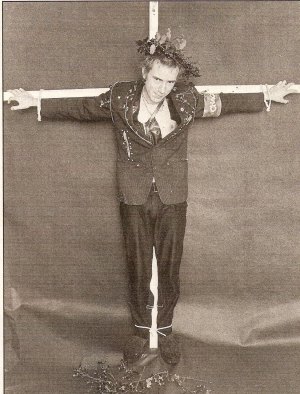
JOHN LYDON: Yes, I am.
PHAWKER: Do you want to talk about the election at all? Have you been following it?
JOHN LYDON: No, I know what’s going on but everyone should have the right vote for who they like and not make enemies of different points of view. That would be all I have to say on that so obviously I’m not very favorable to Mr. Trump, so let’s move on.
PHAWKER: Okay, another aspect of contemporary American life that I wanted to give you an opportunity to weigh in on is the fact that the NSA is collecting the phone, email and Internet history of every citizen. I’m curious to hear what your thoughts are is this whole Snowden surveillance thing that’s going on?
JOHN LYDON: How is any of that a big surprise? I think ever since the phone was invented it’s been tapped really. What’s the news there?
PHAWKER: As a freshly-naturalized American citizen, you don’t find this objectionable or in violation of your newly-bestowed 4th Amendment Constitutional protections from unreasonable search and seizure?
JOHN LYDON: Yeah I know what you’re trying to draw me into but quite frankly I’m in the middle of a tour and I’m trying to do the best I can with what is my career of choice and waffling on about other people’s interpretations of the law is really a waste of my time right now. When I have the time to deal with that I will but let’s not get all of our angles dangling at once, shall we? You’re trying to mislead me into something that isn’t quite correct.
PHAWKER: Let’s talk about the song “Corporate” on the new album. You invoke the word “murderer” over and over again, tell me about the gist of this song.
JOHN LYDON: That’s what corporations do, they murder your freedom of ideas, your freedom of thought, your individuality. You need look no further than say, Nike, that murders individuality. Everybody wearing the same sneakers, everybody wanting to look the same, do the same. Whether that be the new rounded beards that are going on out there that bore me to death or even the grey tea cozy hats that every second butthole seems to have on the top of their head. This is corporate reality. They are victims of that yet every single one of them thinks they’re some kind of rebel, they’re not. They’re the great big, dull normal, and that is murder to me.
PHAWKER: Is it still possible to carve out an individual space in a modern society so thoroughly controlled and homogenized by multi-national corporations?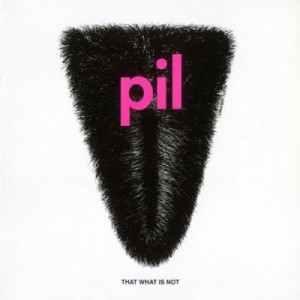
JOHN LYDON: Yes, of course it is, I’m doing quite well at that. And you know if I need to lead by example well, hello here I am. I’ve managed to maintain a very healthy career based on not telling lies, not imitating, not stealing, and not wanting to lose my own individuality. The greatest compliment anyone could pay me would be to pay attention to themselves.
PHAWKER: So the song “Big Blue Sky,” I think I read elsewhere that the song is about the vast open spaces of the American landscape.
JOHN LYDON: Yeah I’m utterly in love with everything; Nevada, Utah, New Mexico, Texas, Arizona, and the California desert. I love that environment. I’ve always been moved by it. The tour previous to this, we were lucky enough to drive through it, and we would stop the bus several times and just to breathe in that overwhelming atmosphere. It’s so startling and so we wanted to write a song about it, and “Big Blue Sky” is right there. But you have to remember that there used to be an indigenous population roaming those deserts, and so I have to mention their murder. It’s just the way it is. Now I’ve become an American citizen I intend to tell the truth just as much as I did when I was a British citizen, or an Irish citizen previous to that. I’m Johnny and I come bearing gifts as an American.
PHAWKER: Let’s talk about the song “Shoom.” Tell me about the title of that song, what does ‘shoom’ mean?
JOHN LYDON: Well it’s based on a broken drum machine that made this shoom noise. Quite seriously and we just expanded from there and it turned into a requiem really to my deceased father. He died a couple years back, and I miss him very much. I was remembering his sense of humor and what good company he could be in public houses, that’s pubs to you, and just that working-class, dry delivery that’s like both honest and at the same time very inspiring and there it is. The song is basically his voice but with my accent. I didn’t want to turn the song into a fake Irish kind of thing. But that’s the true voice of my dad and it’s a song that brings a tear to my eye. He was a man I never came to grips with in my early childhood, but we became very good friends in later years. I miss him dearly. So the song is done with a sense of wit, it’s not a vicious, nasty thing at all.
PHAWKER: Backing up to the first song “Double Trouble” the song begins with what sounds like one end of an argument, perhaps between an old married couple. I read somewhere that you are actually paraphrasing an actual exchange you had with your wife about a toilet you installed. Tell me a little bit about that.
JOHN LYDON: Well yeah I had actually installed the toilet myself a few years prior, and when another toilet went astray on us my Mrs. presumed I would automatically put in a new one, which I wasn’t prepared to do. The argument that ensued is more or less the song and I thought it ended up to be a rather good idea. It is what happens, you become too used to each other and you can end up having these bitter twisted arguments that neither of you actually mean in a hateful way but could lead to a serious problem. And so there it is really, how not to unravel domestic tensions.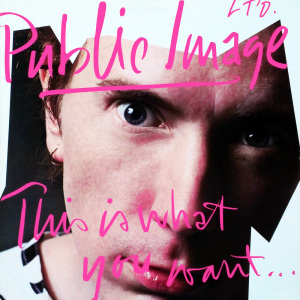
PHAWKER: [Former Sex Pistols Svengali] Malcolm McLaren passed away from mesothelioma, which is caused by asbestos. Reportedly there was a lot of asbestos in the walls of Sex, the London boutique he ran with Vivian Westwood, which is where McLaren discovered you and later recruited you to be frontman of the then-embryonic Pistols. Apparently, McLaren was knocking down walls with a sledgehammer, without any protective gear, when they were getting the shop ready to open. Is this on your radar, is this anything you’re concerned about?
JOHN LYDON: No and you’re juxtapositioning quite a few different events there. Wherever you’re getting your information from you’re wrong. The walls that were pulled down were in a rehearsal room, nothing to do with the shop that he and his partner ran. So this is the trouble with people regurgitating the past it’s usually done wrong. I don’t need to go back there, I’ve dealt with it, it’s in all my books, just read.
PHAWKER: I was surprised to learn that Ginger Baker from Cream played drums on Album. Was that your idea?
JOHN LYDON: What do you mean? It’s my album. I am PiL and I invited him on to it. Really what you just said is really absurd, fella. I think we should knock this on the head it’s going nowhere.
PHAWKER: Well, that escalated quickly. What do you want to talk about?
JOHN LYDON: Nothing really. I mean you’re so far off the mark it’s pointless. I’ll say goodbye and just tell people to come to the gig and enjoy something really excellent, honest, and decent in a music industry that is vile and corrupt, two things I’m certainly not. I’m pleasant. open-minded, friendly, and loving, and I think my career shows that, although certain journalists would differ from that opinion, but I would be the one that will be correct. Bye bye.
PUBLIC IMAGE LTD PERFORM @ UNION TRANSFER TUESDAY OCTOBER 16TH

